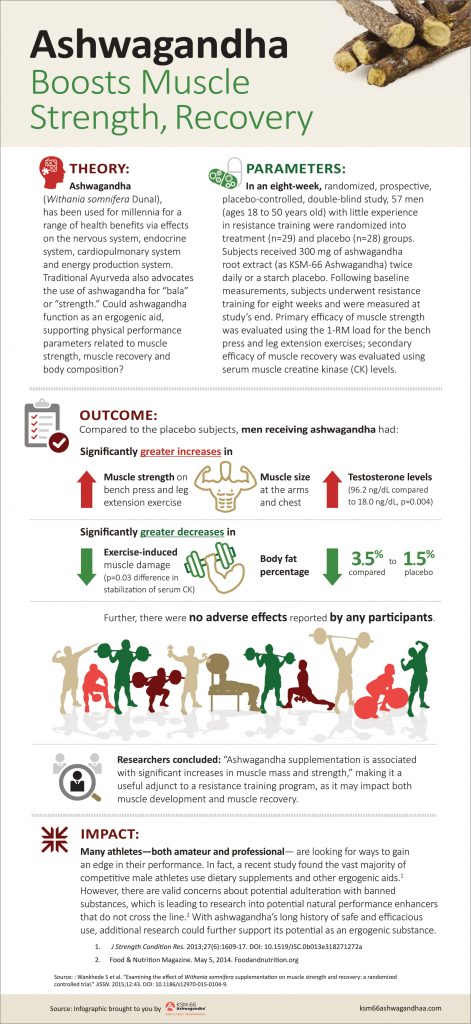Ashwagandha for Sports Recoveries
July 2020
Theory
Ashwagandha (Withania somnifera Dunal), has been used for millennia for a range of health benefits via effects on the nervous system, endocrine system, cardiopulmonary system and energy production system. Traditional Ayurveda also advocates the use of ashwagandha for “bala” or “strength.” Could ashwagandha function as an ergogenic aid, supporting physical performance parameters related to muscle strength, muscle recovery and body composition?
Parameters
In an eight-week, randomized, prospective, placebo-controlled, double-blind study, 57 men (ages 18 to 50 years old) with little experience in resistance training were randomized into treatment (n=29) and placebo (n=28) groups. Subjects received 300 mg of ashwagandha root extract (as KSM-66 Ashwagandha) twice daily or a starch placebo. Following baseline measurements, subjects underwent resistance training for eight weeks and were measured at study’s end. Primary efficacy of muscle strength was evaluated using the 1-RM load for the bench press and leg extension exercises; secondary efficacy of muscle recovery was evaluated using serum muscle creatine kinase (CK) levels.

Outcome
Compared to the placebo subjects, men receiving ashwagandha had:
Significantly greater increases in
- Muscle strength on bench press and leg extension exercise
- Muscle size at the arms and chest
Testosterone levels (96.2 ng/dL compared to 18.0 ng/dL, p=0.004)
Significantly greater decreases in
- Exercise-induced muscle damage (p=0.03 difference in stabilization of serum CK)
- Body fat percentage 3.5% to 1.5% compared placebo.
Further, there were no adverse effects reported by any participants.
Researchers concluded
“Ashwagandha supplementation is associated with significant increases in muscle mass and strength,” making it a useful adjunct to a resistance training program, as it may impact both muscle development and muscle recovery.
Impact
Many athletes—both amateur and professional— are looking for ways to gain an edge in their performance. In fact, a recent study found the vast majority of competitive male athletes use dietary supplements and other ergogenic aids.[1] However, there are valid concerns about potential adulteration with banned substances, which is leading to research into potential natural performance enhancers that do not cross the line.[2] With ashwagandha’s long history of safe and efficacious use, additional research could further support its potential as an ergogenic substance.
- J Strength Condition Res. 2013;27(6):1609-17. DOI: 10.1519/JSC.0b013e318271272a
- Food & Nutrition Magazine. May 5, 2014. Foodandnutrition.org
